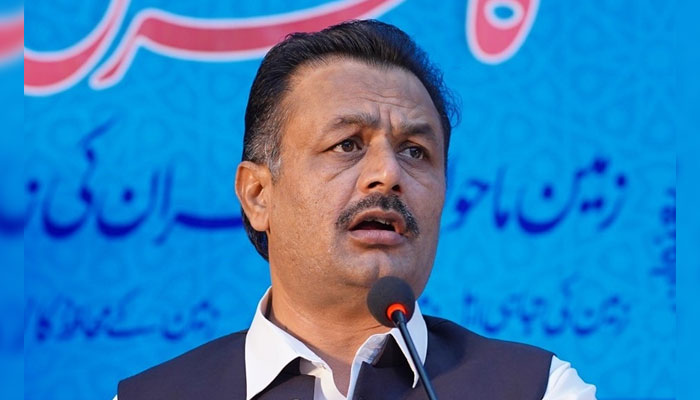Air pollution levels now in ‘very unhealthy range’ in several areas: CM’s adviser
The Sindh Environmental Protection Agency (Sepa), under the Department of Environment, Climate Change and Coastal Development, organised a seminar titled “Environmental Governance and Sustainability Challenges in Sindh” at Beach Luxury Hotel, Karachi.
The event was attended by guests, prominent environmental experts, industrialists, secretaries from various Sindh government departments, civil society representatives, and other key stakeholders.
Additionally, several distinguished participants joined the seminar virtually via Zoom. The seminar aimed to discuss pressing environmental challenges in Sindh and explore sustainable solutions.
Addressing the event as the chief guest, Advisor to the CM on Environment, Climate Change Dost Muhammad Rahimoon reiterated the government’s commitment to strengthening environmental governance. He emphasized the importance of effective enforcement of environmental regulations, key policy initiatives, and public awareness in achieving sustainability.
He also highlighted the need for collective action among all stakeholders to tackle issues such as plastic waste, solid waste management, marine pollution, and industrial emissions. He pointed out that air pollution levels in several areas have reached the "unhealthy" to "very unhealthy" range, while water quality in many locations remains unfit for human consumption.
The adviser urged industrial sectors to adopt eco-friendly policies and take responsibility for reducing pollution.
Director General Sepa Naeem Ahmed Mughal delivered the keynote address presenting findings from Sepa’s latest environmental survey, which revealed alarming levels of air and water pollution across Sindh.
Secretary Environment, Climate Change and Coastal Development Department Agha Shah Nawaz highlighted the Sindh government’s efforts toward environmental protection and sustainability.
Discussions during the seminar underscored that Sindh, despite its rich natural resources and diverse ecosystems, faces significant environmental challenges, including pollution, excessive noise levels, industrial waste disposal issues, and inadequate waste management.
Experts stressed that environmental sustainability is not solely the government's responsibility; rather, it requires the active participation of industries, citizens, and civil society organizations.
To address these challenges, the government is taking multiple initiatives, such as strengthening environmental monitoring systems, improving waste management strategies, protecting coastal areas, and introducing new policies for sustainable urban planning. Participants agreed on the need for adopting eco-friendly practices, ensuring compliance with environmental laws, and implementing modern, effective strategies for sustainable development.
The seminar concluded with a souvenir distribution ceremony, where speakers and environmental experts were honoured with commemorative shields in recognition of their contributions.
-
 Andrew Mountbatten Windsor Faces Future With UK MPs, Says Expert
Andrew Mountbatten Windsor Faces Future With UK MPs, Says Expert -
 Shamed Andrew Told 'nobody Is Above The Law' Amid Harrowing Silence
Shamed Andrew Told 'nobody Is Above The Law' Amid Harrowing Silence -
 Gisele Bundchen Melts Hearts With Sweet Bike Ride Glimpse Featuring Son
Gisele Bundchen Melts Hearts With Sweet Bike Ride Glimpse Featuring Son -
 Prince William Found Meghan Markle ‘quite Refreshing’ At Start
Prince William Found Meghan Markle ‘quite Refreshing’ At Start -
 Kate Middleton Knew Should Could Not Be ‘voice Of Reason’ With Prince Harry
Kate Middleton Knew Should Could Not Be ‘voice Of Reason’ With Prince Harry -
 Rihanna Has Wardrobe Malfunction At A$AP Rocky Fashion Show
Rihanna Has Wardrobe Malfunction At A$AP Rocky Fashion Show -
 Prince Harry Felt System Had ‘one Rule For Him, One For Prince William’
Prince Harry Felt System Had ‘one Rule For Him, One For Prince William’ -
 Jake Paul's Fiancée Sends Him Over The Moon Over Stunning Victory
Jake Paul's Fiancée Sends Him Over The Moon Over Stunning Victory -
 Harper Beckham Sends Valentine’s Love Amid Brooklyn Family Drama
Harper Beckham Sends Valentine’s Love Amid Brooklyn Family Drama -
 Why Prince William, Kate Middleton 'partnership' Is Important For Monarchy
Why Prince William, Kate Middleton 'partnership' Is Important For Monarchy -
 Katie Price Drama Escalates As Family Stays In Touch With Ex JJ Slater
Katie Price Drama Escalates As Family Stays In Touch With Ex JJ Slater -
 Critics Target Palace Narrative After Andrew's Controversy Refuses To Die
Critics Target Palace Narrative After Andrew's Controversy Refuses To Die -
 Sarah Ferguson’s Delusions Take A Turn For The Worse: ‘She’s Been Deserted’
Sarah Ferguson’s Delusions Take A Turn For The Worse: ‘She’s Been Deserted’ -
 ICE Agents 'fake Car Trouble' To Arrest Minnesota Man, Family Says
ICE Agents 'fake Car Trouble' To Arrest Minnesota Man, Family Says -
 Camila Mendes Reveals How She Prepared For Her Role In 'Idiotka'
Camila Mendes Reveals How She Prepared For Her Role In 'Idiotka' -
 China Confirms Visa-free Travel For UK, Canada Nationals
China Confirms Visa-free Travel For UK, Canada Nationals




